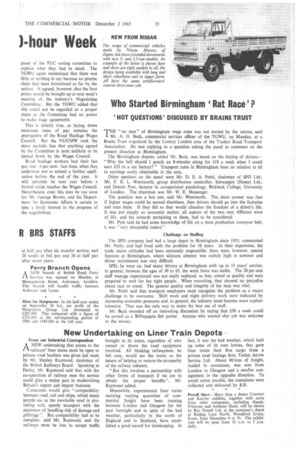Who Started Birmingham Rat Race' P
Page 37

If you've noticed an error in this article please click here to report it so we can fix it.
HOT QUESTIONS DISCUSSED BY BRAINS TRUST
-i'HE "rat race" of Birmingham wage rates was not started by the unions, said 1 Mr. A. G. Beck, commercial services officer of the TGWU, on Monday, at a Brains Trust organized by the Central London area of the Traders Road Transport Association. He was replying to a -question asking the panel to comment on the present situation at Birmingham.
The Birmingham dispute, added Mr. Beck, was based on the feeling of drivers" Why the hell should I punch an 8-wheeler along for £18 a week when I could earn £35 in a car factory?" Transport rates in Birmingham bore no relation at all to earnings easily obtainable in the area.
Other speakers on the panel were Mr. D. E. A. Pettit, chairman of SPD Ltd.; Mr. F. R. L. Wentworth, group distribution controller, Schweppes (Home) Ltd.; and Dennis Pym, lecturer in occupational psychology, Birkbeck College, University of London. The chairman was Mr. W. E. Messenger.
The question was a hot one, said Mr. Wentworth. The short answer was that if higher wages could be earned elselthere, then drivers should go into the factories and earn them. If they did so they would abandon the freedom of a driver's life. It was not simply an economic matter; all aspects of the two, very different ways of life, and the rewards pertaining to them, had to be considered.
Mr. Pym said he had some knowledge of life on a mass production conveyor belt; it was "very distasteful indeed ".
Challenge on Staffing
The SPID company had had a large depot in Birmingham since 1955, commented Mr. Pettit, and had lived with the problem for 10 years. In their experience, the trade union attitudes had been extremely responsible; there were, however, special features at Birmingham, where sickness absence was unduly .high in summer and driver recruitment was very difficult.
SPD, he went on, had many drivers at Birmingham with up to 15 years' service; in general, between the ages of 30 to 65, the work force was stable. The 20 per cent staff wastage experienced was not easily replaced, as they aimed at quality and were prepared to wait for the right people. When recruiting, they showed no prejudice about race or creed. The general quality and integrity of the man was vital.
Mr. Pettit said that transport employers must recognize the problem as a major challenge to be overcome. Shift work and night delivery work were indicated by increasing economic pressures and, in general, the industry must become more capitalintensive. That was the only way to make the best use of staff.
Mr. Beck rounded off an interesting discussion by saying that £50 a week could be earned as a Billingsgate fish porter. Anyone who wanted that job was welcome to the money.
















































































































































































